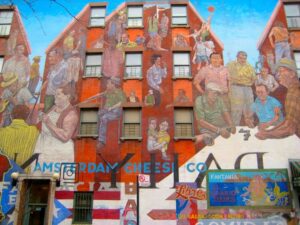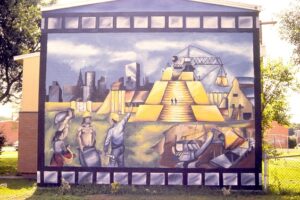Seminar: Urban Latino Studies



DESCRIPTION
This seminar will examine the presence of Latinos in US cities since the mid-nineteenth century. How have Latinos, defined as an immigrant or culturally alien racialized ethnic demographic been part of urban spaces in the US over the last 150 years? How have Latinos, in their diverse origins and conditions, participated in processes that define and transform the urban space? We will look at residential patterns, voting, work, industry, ethnic conflict and racism, urban decline, policing, urban reform, public housing, gentrification, cultural production, and others—all examined in the context of urban spaces and dynamics. We will also look at discussions of Latino urbanism and Latino urban cultures.
The course will provide in-depth views into cities drawing on a mix of historical and social science materials. We will spend about ten weeks studying the experience of Latinos in these cities, each one providing a varying set of themes based on different regional, economic, political, racial and social contexts.
- Mexican Americans and Mexican immigrants in San Antonio, Texas: internal colonialism, labor history, WWII, Chicano music
- Puerto Ricans in New York City: Colonial citizen immigrants, industrial work, pan-latino culture, labor unions, urban crisis, radical movements, anti-poverty
- Mexican-Americans and Puerto Ricans in Chicago: urban renewal, housing, social movements, immigration
- Cubans in Miami: exile, the enclave,
- Mexican-Americans and Central Americans in Los Angeles: industrial work, civil rights, urban protest, riots, immigration
- Dominicans in Washington Heights (NYC) and Providence (RI): housing, policing, race relations, urban crisis
- Mexicans and Central American immigrants in sanctuary and deportation cities: New York City, Phoenix, Arizona and Birmingham, Alabama
My approach to Latino studies requires the careful study of local urban contexts and constant questioning of the categories we use to research, understand, and explain the past. The course will review the strengths and weaknesses of race/ethnic studies, as well as provide a critique of mainstream US history which leave Latinos pretty much out of the national historical narrative.
GOALS
Along the way we will read public and private documents, use maps and demographic statistics, read scholarly literature and produce our own research projects. As part of this work I will provide various training sessions in research methods and will leave the last four weeks of the semester for individual sessions and the presentation of student research work.
Additionally, by the end of the semester students will be able to:
- compare and contrast the historical experiences of different groups of urban Latino demographics with regard to place, space, race/ethnicity, class, and politics
- define and understand the basic concepts and sources of data for urban studies
- develop critical thinking skills through analysis of historical scholarship and primary sources
- effectively and constructively critique fellow students’ works-in-progress and to benefit from peer review
- design and execute a formal paper with a clear research questions and a rigorous and convincing argument about urban and Latino history
COURSE READINGS
All Readings will be provided through Sakai.
COURSE REQUIREMENTS AND ASSESSMENT
Students will produce their own modest research project that focus on New Jersey urban spaces using assigned sources to answer defined questions. Student research projects will involve census data, newspapers, government reports and other sources. I will provide training sessions in research methods and will leave the last four weeks of the semester for individual advising and the presentation of student work.
- Determination of Grade:
- Participation, attendance = 20%
- Three short discussion papers based on class readings (2-3 pages) = 45%
- Research Paper (10-12 pages) = 35%
- Class Participation and Attendance:
- Class participation consists of attendance, thoughtful contributions to in-class and/or on-line discussions, and presentations. Throughout the semester, discussion initiators will be responsible for synthesizing readings, posing questions, and facilitating class engagement with materials.
- This is a once-a-week seminar. No absence will be excused unless you have a medical note or a family related crisis.
- Short Assignments:
- I will give you short assignments more or less every other week. They might be focused on the readings, on methodological issues or on finding and handling specific kinds of sources.
- Research Paper:
- The informal written responses will build toward a research paper on a topic of your choosing (in consultation with me) on an aspect of the Latino urban experience in a specific city. You will use class materials as well as outside sources.
- Academic Integrity Policy:
- All students enrolled in the School of Arts and Sciences are responsible for upholding the highest standards of student behavior in accordance with the University’s Code of Student Conduct and Academic Integrity Policy.
- Office of Academic Integrity: http://academicintegrity.rutgers.edu
- Office of Student Conduct: http://studentconduct.rutgers.edu/
COURSE SCHEDULE
Week 1: Introduction: What is Latino Studies? What is Urban studies?
Week 2: Mexican Americans and Mexican immigrants in San Antonio, Texas, 1880s-1950s
Week 3: Puerto Ricans in New York City: 1910s-1940s
Week 4: Mexican-Americans in Los Angeles, 1900-1940s
Week 5: Puerto Ricans in New York City: 1950s-1980s
Week 6: Mexican-Americans and Puerto Ricans in Chicago, 1960s-1980s
Week 7: Cubans in Miami, 1890s, 1960s-1970s
Week 8: Dominicans in Washington Heights, New York City
Week 9: Mexicans and Central American immigrants in sanctuary and deportation cities, 1980s-2010s
Week 10: Mexican-Americans and Central Americans in Los Angeles, 1950s-1990s
Week 11: Individual meetings and research, weekly report due
Week 12: Individual meetings and research, weekly report due
Week 13: Individual meetings and research, weekly report due
Week 14: Presentations and discussion
FINAL PAPER DUE FRIDAY May XX